Content
Instructions for the use of Glyocladin for plants apply to all crops. The drug is widely known among gardeners and is one of the best helpers in the fight against various diseases found in the garden. It helps to cope with ailments of fruit, berry, vegetable crops, as well as flowers and ornamental shrubs. At the same time, it does not damage plants, the environment, does not harm birds, animals and insects, does not harm human health.
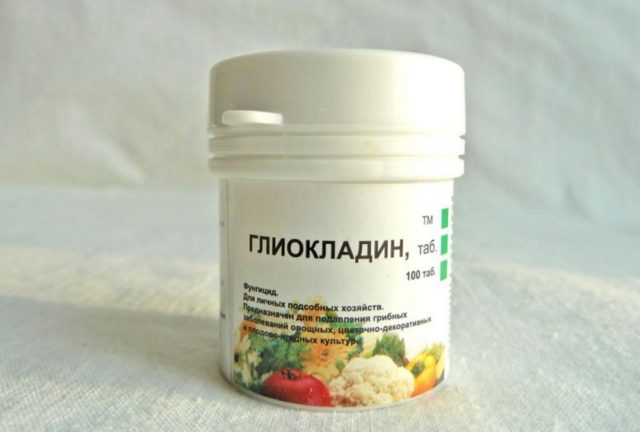
The tool is applied before sowing and planting seedlings
Description of the drug Glyocladin
"Glyocladin" is a microbiological drug that suppresses the development of fungal and bacterial diseases in plant crops. Belongs to the class of fungicides and biological pesticides. "Glyokladin" and its use in garden plots have long been widely popular. It is applied to seedlings of fruit trees, berry bushes, flowers and vegetables. Summer residents love it for its simple application and proven effectiveness.
The composition of the drug Glyocladin
Tablets "Glyokladina" have a biological breed. Their main component is the mushroom culture Trichoderma harzianum. Under favorable conditions, its mycelium begins to actively grow, and the forming fungus exerts its vital activity protective actions for plants, without entering into symbiosis with their roots.
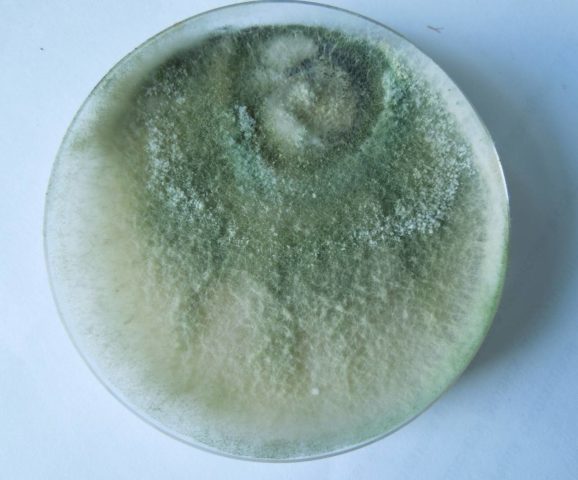
The active ingredient of the "Glyokladin" biocomplex is a mushroom - Trichoderma
Forms of issue
Glyokladin is manufactured by a Russian manufacturer, AgroBioTechnology.
There are several forms of its release:
- Pills. They go on sale in plastic cans and cartons for vegetables and flowers, 1000 and 100 pieces each.
- Wettable powder. Can be found in 60 g cans.
- Suspension. Ready-made concentrate in 5-liter cans.
Purpose and principle of operation
The main purpose of the highly effective soil biofungicide "Glyocladin" is the disinfection of the soil from various fungal infections and their pathogens. First of all, the use of the substance is aimed at protecting against root and root rot of flower, cucumber and tomato crops.
"Glyokladin" is most often introduced into the soil at the stage of cultivation, at the time of transplanting seedlings, as well as in closed ground: in greenhouses, hotbeds, greenhouses.
The basis of the complex, which triggers the mechanism of action, is the antagonist mushroom Trichoderma. After getting into the ground, it begins to create a powerful mycelium, using the mycelium of parasites. Thus, the growth of pathogenic microorganisms is suppressed and destroyed. In addition, the fungus secretes antibiotics that block the development of many diseases.
The substance is used not only for medicinal purposes, but also for disinfecting the soil mixture when picking seedlings and planting them in a permanent place.
"Glyocladin" breaks down organic matter, releases carbon, enriches the soil, and also accelerates plant growth, increases their immunity and resistance to many diseases.
Application area
The drug is very famous. It is used as a preventive measure and treatment for fungal diseases on indoor and garden plants, fruit trees and flowers. Usually used against root rot and infections in the ground:
- late blight;
- pityosis;
- alternaria;
- fusarium;
- verticillosis;
- rhizoctonia.
The tablets have worked well against powdery mildew, mildew, and purple spotting.
Consumption rates
In the instructions for "Glyokladin" it is written that in each case of using the agent it is recommended to individually calculate the consumption of the substance.
Gardeners should act according to the scheme:
- For 300 ml of soil, take 1 tablet of the drug.
- For a pot with a diameter of up to 17 cm, 3 pills are needed, and with a size of 20 cm or more - 4.
- When planting vegetables, it is recommended to add 3-4 tablets per hole.
- When picking and sowing seeds of flowers, cucumbers and tomatoes, 1 piece should be embedded in the soil. "Glyokladina" to a depth of at least 1 cm.
To prepare the liquid form, you need to add approximately 50 g of the product to 500 ml of water. The suspension should be poured into the irrigation tank and consumed within two hours.
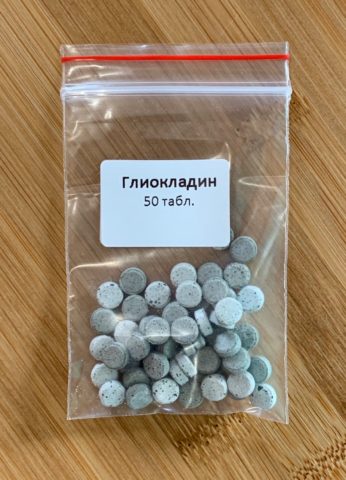
The tablets should be buried in the ground, they do not dissolve in water.
Instructions for use of the drug Glyocladin
When using tablets "Glyokladina" they are placed in the ground to a depth of one and a half centimeters, dry, once a season. One piece is enough for 1 plant, hole or 300-800 ml of soil.
When using a suspension or powder, the product is diluted in water according to the instructions on the package. The liquid preparation is usually applied in the spring and a week after steaming the soil in the greenhouse. Treatment can be done by spraying or watering. After the procedure, the site is dug up so that the mushroom spores are evenly distributed over the ground. The dosage of liquid "Glyocladin" is as follows: 1-2 buckets of working solution per 100 m of soil or 60-150 ml of suspension per 1 hectare.
The drug retains its action in the upper soil layer. Ideal conditions for it: embedment depth up to 8 cm, humidity from 60 to 80%, temperature + 20-25 degrees Celsius, acidity 4.5-6. Deviation from the norms will lead to a slowdown in the growth of mushroom mycelium and a decrease in the effect.
How to use Glyocladin for seedlings
To get healthy seedlings, tablets of "Glyocladin" are introduced into the ground at the stage of picking the sprouts into temporary boxes. You need to put half a tablet on one well. When planting grown seedlings in the ground, the calculation is as follows: 1 tablet per 1 well. Actions are especially relevant when growing cucumbers and tomatoes.
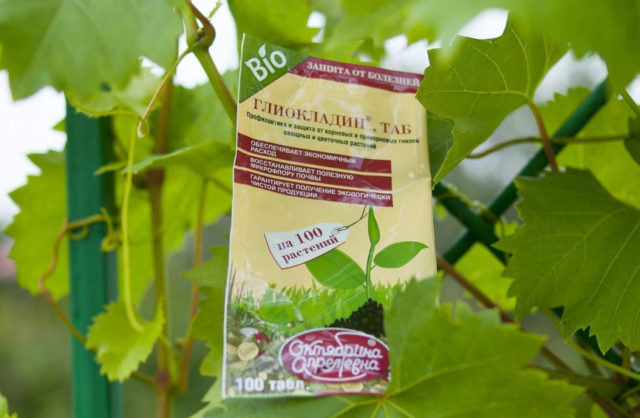
The product is not used for spraying plants
For vegetable crops
From the instructions for the use of "Glyocladin" for plants and, judging by the reviews of gardeners, it is clear that the effect of the use of a bio-substance will be achieved only if it is used correctly:
- When sowing seeds, the tablets should be added to the soil, water it well and leave the containers with the planting material warm under the film.
- For the prevention of diseases, apply once (1 piece - 1 plant).
- For treatment, use 2 tablets per plant.
- When planting potatoes, add 2 pills per tuber.
How to use Glyocladin for flowers and ornamental shrubs
Tablets "Glyokladina", judging by the instructions for use and reviews, have a beneficial effect on the growth of ornamental shrubs and garden flowers. After using them, the buds become stronger and larger, bloom longer. They use the drug according to the same scheme as for vegetables (1 plant - 1 table). In warm weather, the product retains its beneficial effects for 1-2 months.
For indoor flowers and plants
The preparation "Glyocladin" for indoor plants is usually used for their transplantation. Put one tablet in small pots, three pills in containers with a diameter of more than 17 cm, it is desirable to place 4 in large pots. First, put earth in the container, place "Glyokladin" in the center, plant a flower and cover with soil.
If the pills did not help, it means that the treatment was carried out late, and in order to overcome the disease, stronger means will be required.
For fruit and berry crops
For fruit trees and large berry bushes, the fungicide is rarely used, and it only helps to prevent diseases. In case of infection, its action becomes ineffective. It is preferable to use "Glyocladin" for small plants: strawberries, strawberries, preferably in liquid form. It is necessary to spray the bushes in the phase of flowering and ripening of berries.
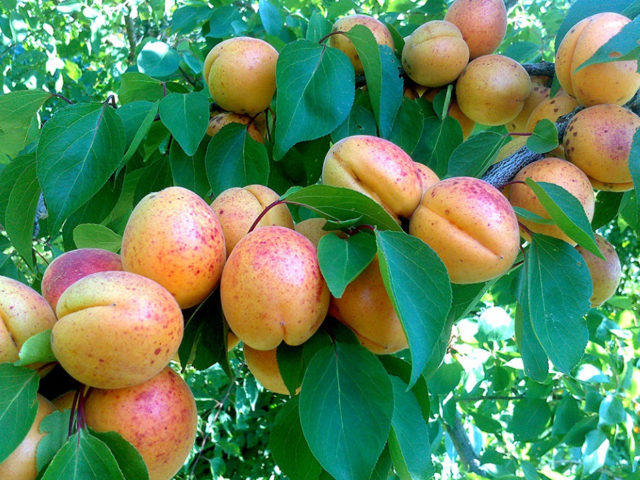
Liquid solution of "Glyocladin" must be used no later than 4 hours after preparation
How to treat raspberries with Glyocladin for purple spot
Although the instructions for using the drug Glyocladin for plants do not say anything about the treatment of purple spot (fungal disease), gardeners advise using it for this ailment on raspberries. The first treatment should be carried out in the spring, before the buds open. The second (spraying) - at the time of flowering.
How are Glyocladin tablets used for grafting
The drug in tablet form can be used for root cuttings, rooting of blackberries, raspberries and rose hips (1 cuttings - 1 tablet).
To strengthen green cuttings (roses, sea buckthorn, lilac, indoor flowers), use a substance in suspension, which is added to water. The solution is stored at a temperature of +5 °C, no more than a month. Allow it to warm up before use.
Advantages and disadvantages
Fungicide "Glyocladin" (see photo) has a number of advantages, these include:
- Easy to use.
- One-time processing.
- Safety for people, animals, fish and birds.
- Non-toxic.
- Effectiveness in the fight against pathogens of many diseases.
- Long term of validity.
- The ability to increase the yield.
- Improving the soil and improving its microflora.
- Eliminate the need for chemical pesticides.
- Growth-stimulating action.
Of the disadvantages of the drug, only the fact that it is often counterfeited can be noted. By purchasing a low-quality product, there is a chance either to harm the garden, or not to see the result.
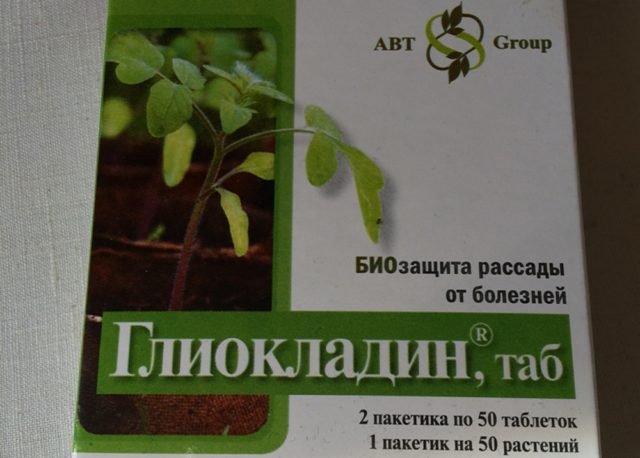
When buying a drug, it is important to beware of counterfeits.
Compatibility with other drugs
"Glyocladin" can be combined with any other biofungicides, insecticides, fertilizers, growth regulators and chemical herbicides. To increase efficiency, it can be used in combination with the drug "Planriz", "Gamair", "Alirin".
A limitation is the simultaneous use with chemical fungicides, as well as with other pesticides, with the exception of analogues containing Trichoderma strains.
Security measures
Tablets for plants "Glyocladin" have a hazard class 4, harmless to human health and practically non-toxic to plants, can be used in the area of water bodies.
If a person accidentally swallows a pill of the drug, to prevent unpleasant consequences, it is necessary to wash the stomach and consult a doctor. It is better to work with the substance with gloves.
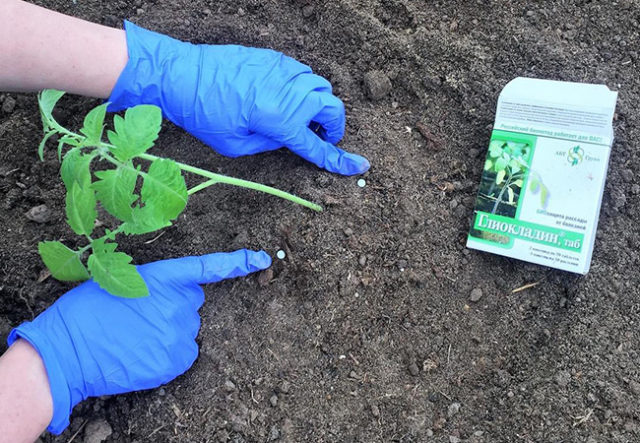
The validity period of "Glyokladin" is 2 months after making
Storage rules
Biocomplex "Glyokladin" should be stored in a cool dry room, at a temperature of + 6-14 °C, away from drugs and food. The place must be out of reach of children and animals.
In a sealed package, "Glyokladin" is stored for two years.
Glyokladin's analogs
The tool can be replaced with drugs similar in mechanism of action, they are:
- Trichocin.
- Trichodermin.
- Trihozan.
- Trichoflor.
- Alirin-B.
- Gamair.
- Baktofit.
Before using each drug, it is important to carefully read the instructions. Make sure that after applying them, the desired effect and benefit will be achieved in full.
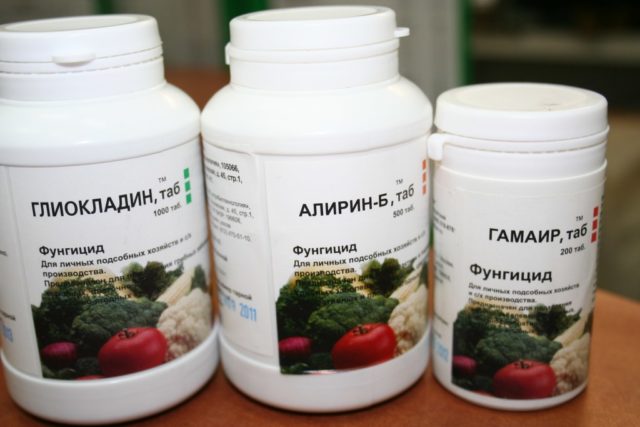
For the prevention of root rot, use 1 tablet to a depth of at least 1 cm
Conclusion
Instructions for the use of Glyocladin for plants informs that the agent is able to prevent diseases of domestic and garden plants without having a detrimental effect on them. Judging by the numerous reviews of the drug, gardeners were convinced of its effectiveness from their own experience and every year they try to use a biological fungicide on their own backyard plots. The popularity of pills is growing from year to year.








